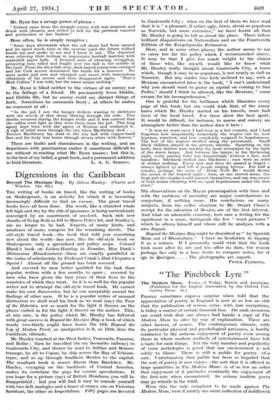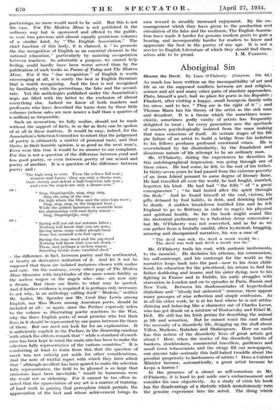" The Pinchbeck Lyre " The Modern Muse. Poems of
Today, British and American. (Published for the English Association by the Oxford Uni- versity Press. 5s.) PEOPLE sometimes express surprise when told that the appreciation of poetry in England is now at so low an ebb that the publication of serious verse, with rare exceptions, is today a matter of certain financial loss. On such occasions one could wish that one always had handy a copy of The Modern Muse to offer by way of explanation. There are other factors, of course. The contemporary climate, with its particular physical and psychological pressures, is hardly conducive, to the arduous enjoyment of poetry even among those in whom modern methods of entertainment have left a taste for such things. Yet the very number and popularity of verse anthologies is proof that our environment is not solely to blame. There is still a public for poetry—of a sort. Unfortunately that public has been so beguiled that the sort of poetry it now enjoys—the sort that it is offered in large quantities in The Modern Muse—is of so low an order that enjoyment of it precludes eventually the enjoyment of the first-rate when encountered. So serious modem poets may go -whistle in the wind.
Were this the only complaint to be made against The Modern Muse, were it merely one more collection of indifferent poeticisings, no more would need to be said. But this is not the case. For The Modern Muse is not published in the ordinary way but is sponsored and offered to the public, as were two previous and almost equally pernicious volumes of a similar kind, by " The English Association." The chief function of this body, it is claimed, is " to promote the due recognition of English as an essential element in the national education," particularly by assisting co-operation between teachers. So admirable a purpose, we cannot help feeling, could hardly have been worse served than by the publication of such books as Poems of Today and The Modern Muse. For if the " due recognition " of English is worth
encouraging at all, it is surely the best in English literature that is worth recognizing. And the best is not recognized by familiarity with the pretentious, the fake and the second- rate. Yet the anthologies published under the Association's aegis are filled with the latter to the exclusion of almost everything else. Indeed we know of both teachers and professors who have described the harm done by these little
volumes (whose sales are now nearer a half than a quarter of a million) as irreparable.
Such an accusation, we fully realize, should not be made without the support of facts, in so far as facts can be spoken of at all in these matters. It would be easy, indeed, for the Association's Selection Committee to retort that the judgement of poetry is ultimately a matter of personal taste, and that theirs, in their humble opinion, is as good as the next man's. Even were this true it would be no answer to our complaint. For this is not a question of the difference between good and less good poetry, or even between poetry of one school and poetry of another. It is a question of the difference between poetry and :
" The high song is over. Even the echoes fail now ; winners and losers—they are only a theme now, their victory and defeat a half-forgotten tale now ; and even the angels are only a dream now."
or :
" Sing, Singsingetjie, sing, sing, sing, Sing the song of the sun !
On high where the blue and the pine-tops meet ; Sing, sing, sing, in the fragrant heat ; While the golden hammers of noontide beat
On shimmering veld and dusty street—
Sing, Singsingetjie, sing."
Or ; " Spring will not all nor autumn falter Nothing will know that you are gone, Saving alone some sullen plough-land None but yourself sets foot upon ; Saving the may-weed and the pig-weed Nothing will know that you are dead,— These, and perhaps a useless wagon Standing beside some tumbled shed."
—the difference, in fact, between poetry and the sentimental, or hearty or derivative imitation of it. And let it not be supposed that these are isolated instances chosen with malice and care. On the contrary, every other page of The Modern
Muse blossoms with ineptitudes of the same comic futility as the useless wagon or the angels who—alas—are now only a &earn. But there are limits to what may be quoted. And if further evidence is required it is perhaps only necessary to ask why, in an anthology calling itself Modern," neither Mr. Auden, Mr. Spender nor Mr. Cecil Day Lewis among English, nor Miss Moore among American poets, should be included at all ; or again, since the Preface expressly refers to the volume as illustrating poetic reactions to the War, why the three English poets of most promise who lost their lives in it should be represented by one poem between the three of them. But one need not look far for an explanation. It is sufficiently explicit in the Preface, in the disarming candour
with which the editors remark that " while a standard of excell- ence has been kept in mind the main aim has been to make the selection fully representative of the various countries." It is comforting at least to learn from this that the question of
merit was not entirely put aside for other considerations. And the note of wistful regret with which they later admit that " although no effort has been spared to make the selection fully representative, the field to be gleaned is so large that omissions have been inevitable." would be humorous were the result not so sickening. For it cannot be too often in- sisted that the appreciation of any art is a matter of training, of hard work in gaining that perception which permits the appreciation of the best and whose achievement brings its own reward in steadily increased enjoyment. By the en- couragement which they have given to the production and circulation of the false and the mediocre, The English Associa- tion have made it harder for genuine modern poets to gain a hearing, and incomparably harder for readers to know and appreciate the best in the poetry of any age. It is not a service to English Literature of which they should find them-.













































 Previous page
Previous page